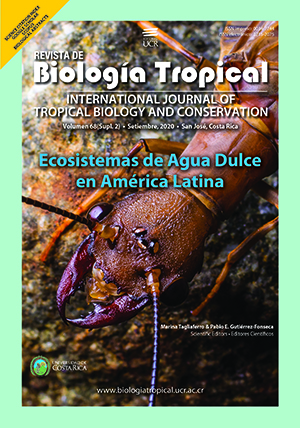Abstract
Introduction: Freshwater research in Latin America has been increasing in recent years, with a large participation of scientists based on local institutions. However, researchers in the region are facing diverse challenges, and we lack a regional overview of the status of freshwater research. Objective: To address this, we surveyed researchers in the region to assess the current activity and challenges faced by the scientific community. We were interested in understanding (1) the type of research currently taking place in the region, (2) the major research gaps, as viewed by local researchers, and (3) the main limitations or obstacles slowing the development of freshwater science in the region. Methods: We prepared a questionnaire with 26 questions regarding the background of participants, their ongoing research priorities, the products generated from their research, and the major limitations they are facing as researchers. Results: We obtained 105 answers from researchers in 19 Latin American countries. Some of the important trends identified included: (1) a focus on stream ecosystems under agricultural and natural forest; (2) emphasis on biodiversity assessment and species inventories; (3) limited ecological research, mostly centered on litter decomposition and food web studies; and (4) communicating research in the form of peer-reviewed papers and reports in gray literature. Major limitations to the scientific activity included: (1) language, with a majority of respondents considering their handling of English a handicap; (2) limited access to research equipment; (3) lack of tools, such as taxonomic keys; and (4) limited research funding. Research needs and priorities resulted in three major areas in need of attention: (1) developing taxonomy and systematics; (2) improving our current understanding of ecology and natural history; and (3) understanding species distributions and biodiversity patterns. Conclusions: Latin America has an active community of scientists. There is a need to diversify research topics, without abandoning traditional research areas (e.g., taxonomy, species distribution). We advocate for more collaboration among scientists with similar research goals, regardless of their affiliation. Improving communication and collaboration among universities and countries within Latin America will certainly facilitate overcoming obstacles and will help shaping a brighter future for freshwater research, and sciences in general, in the region.
References
Bernasconi, A. (2007). Is there a Latin American model of the university? Comparative Education Review, 52(1), 27-52.
Boyero, L., Pearson, R. G., Gessner, M. O., Dudgeon, D., Ramírez, A., Yule, C. M., ... & Mathooko, J. (2015). Leaf-litter breakdown in tropical streams: is variability the norm? Freshwater Science, 34(2), 759-769.
Domínguez, E., & Dos Santos, D. A. (2014). Co-authorship network (and other contextual factors) behind the growth of taxonomy of South American Ephemeroptera: A scientometric approach. Zootaxa, 3754(1), 59-88.
Melo, A. S., Bini, L. M. & Carvalho, P. (2006). Brazilian articles in international journals on Limnology. Scientometrics, 67(2), 187-199.
Moreno, A. I., Rey-Rocha, J., Burgess, S., López-Navarro, I., & Sachdev, I. (2012). Spanish researchers’ perceived difficulty writing research articles for English-medium journals: The impact of proficiency in English versus publication experience. Ibérica: Revista de la Asociación Europea de Lenguas para Fines Específicos, 24, 157-183.
Muñoz, D. A., Queupil, J. P., & Fraser, P. (2016). Assessing collaboration networks in educational research: A co-authorship-based social network analysis approach. International Journal of Educational Management, 30(3), 416-436.
Ramírez, A., & Gutiérrez-Fonseca, P. E. (2014). Estudios sobre macroinvertebrados acuáticos en América Latina: avances recientes y direcciones futuras. Revista de Biología Tropical, 62, 9-20.
Walz, N. (2010). Publications of BRIC- and outreach countries in international journals on limnology. International Review of Hydrobiology, 95, 298–312.
Wojciechowski, J., Ceschin, F., Pereto, S. C. A. S., Ribas, L. G. S., Bezerra, L. A. V., Dittrich, J., Siqueira, T., & Padial, A. A. (2017). Latin American scientific contribution to ecology. Anais da Academia Brasileira de Ciências, 89(4): 2663-2674.
##plugins.facebook.comentarios##

This work is licensed under a Creative Commons Attribution 4.0 International License.
Copyright (c) 2020 Revista de Biología Tropical






